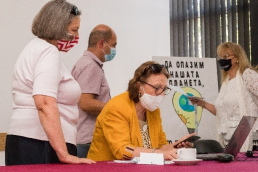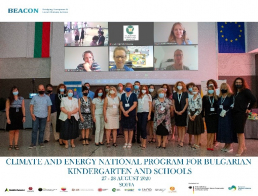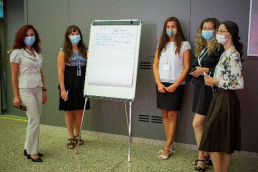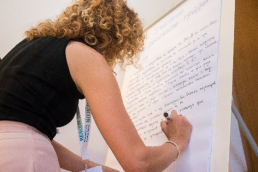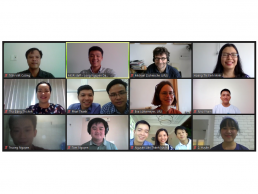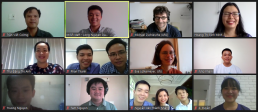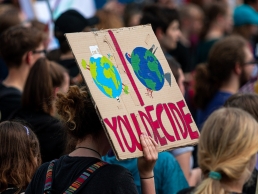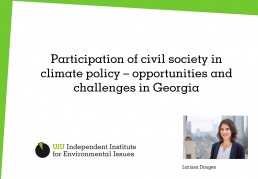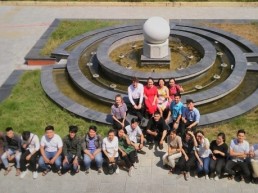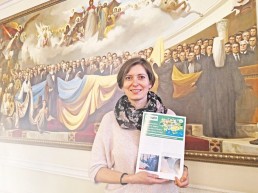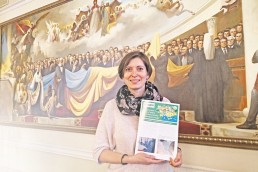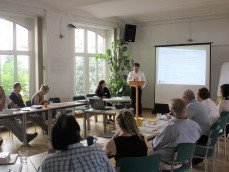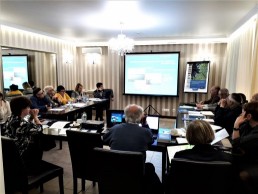Advancing Climate Action and Education for Sustainable Development
07th October 2020
On 24-25 September, representatives from schools and educational institutions as well as research and training institutions and local administrations in the Czech Republic, Romania, Bulgaria, and Germany came together to gain a deeper understanding of Education for Sustainable Development (ESD) and the link to climate action in a virtual BEACON workshop.
After opening remarks by Sarah Heft of BMU on the first day, 31 participants tuned in for a discussion addressing fundamental questions such as what is the goal of ESD and the implementation thereof in relation to climate action? Five panelists provided their unique perspectives:
- Dr. Anne-Katrin Holfelder, Institute for Advanced Sustainability Studies in Potsdam, Germany
- Dr. Ilinca Pandele, AHK, Romania
- Dr. Jiri Kulich, Chairman and member of the Committee for Education for Sustainable Development of the Government Council for Sustainable Development, Czech Republic
- Dimitar Zhelev, Senior Assistant Professor at Sofia University, Faculty of Geology and Geography, Bulgaria
- Peter Schilken, Energy Cities and partner in the BEACON project, Germany/France
The panel discussion was followed by smaller, country-specific breakout sessions amongst participants from the three target countries. Here they focussed on identifying barriers to implementing ESD in their country context as well as ways to overcome these. The discussions were inspired by good practice examples from across Europe. Through these discussions and with the input from experts, it became clear that ESD is a useful pedagogical framework for addressing climate action. Since ESD promotes concepts such as critical thinking, solidarity, foresight, and empowerment and is both participatory and interdisciplinary in nature, it is an ideal framework in which to embed complex topics related to climate action. Dr.Anne-Kathrin Holfelder explained that “young people should feel that they can shape the future” and that ESD lays the foundation for youth empowerment.
On the second day of the event, three separate country workshops took place simultaneously in which different sub-topics of climate action and education for sustainable development were discussed.
Bulgaria
Linking to the discussion on barriers the previous day, the Bulgarian participants, experts, and BEACON partner NTEF focused on climate neutrality and the obstacles they face incorporating the topic into schools. They discussed further how the obstacles could be mitigated and what teachers can already start doing to promote climate neutrality. Some of the largest barriers include the discrepancies in lifestyle/quality of life between smaller towns and large cities as well as the lack of support from school administrations and/or parents. Participants mentioned that European ideas about climate neutrality must be ‘translated’ to the local Bulgarian context, so people can better understand why it matters to them personally.
Romania
The Romanian group led by SNRB dived deep into how ESD can be implemented and how related topics can be digitised to raise the interest of students and other stakeholders. Specifically, they brainstormed ways to make these topics more accessible and incorporate them into the curricula despite the pandemic. For example, an app could be developed that integrates topics like climate change, energy efficiency, online classes, competitions, quizzes, or best practices. The app could also serve as an online platform that integrates classes from different schools and the open classes from BEACON. The participants of the Romanian group will further develop ideas for the app and present them at the BEACON-development workshop in October.
Czech Republic
The Czech participants and BEACON partner SEVEn worked with Veronika Ambrozyová of the NGO People in Need and focussed on why and how to teach climate change. In the discussion, the participants shared tips and tricks as well as their experiences in the classroom.
BEACON’s work in schools continues in the last quarter of 2020 with virtual, cross-border study tours and further workshops towards developing an incentive system for energy savings in schools. Stay tuned for more updates.
Vertical Workshop: Anchoring Climate Action and Energy Efficiency in Bulgarian Schools
02-03. September 2020
„In nine European countries, education on climate change and energy saving is a national government policy. It is time to do it in Bulgaria.“ These words of Dimiter Zhelev, Sofia University professor in the Faculty of Geography, capture the essence of the BEACON workshop that took place on 27-28 August in Sofia. The workshop brought together school directors, municipalities, university trainers, as well as representatives from the Ministry of Education and the Ministry of Environment and Water to explore the creation of a national programme for climate action and energy efficiency education in Bulgarian schools.
This ‘vertical integration’ workshop was led by BEACON partners NTEF, Guidehouse and UfU, and sought to connect actors from the local level with policy makers in the national ministries. “The goals of such workshops are to serve as a platform to share positive experiences, discuss challenges, and ultimately initiate lasting structural changes,” explained Kristen Brand of Guidehouse, who along UfU and the German Federal Ministry for the Environment, joined the meeting virtually. With the support of a nationally administered programme or initiative, the BEACON team could ultimately scale many of its capacity building and energy saving activities across the country.
School directors, municipalities, and academic experts met on day 1 of the workshop to jointly discuss and address key questions about the potential design of such an initiative such as the role of kindergartens and municipalities and the qualification of teachers. They consolidated their points and prepared for discussions with the national government.
These participants were joined on day 2 by representatives of the Ministry of Environment and Water and the Ministry of Education to further discuss these issues. Examples of energy saving initiatives in schools were also presented in addition new statistics compiled by NGO EnEffect on energy consumption (2017-2019) in Bulgarian schools and kindergartens from two EUKI projects, BEACON and TICA. Kamelia Georgieva from NTEF explained that “with only 1% energy savings for one year, we could save enough money to renovate two schools.” This was the first time such statistics was presented in the country. Participants agreed that this information is of great value for the planning and development of such a national initiative going forward. “The reported results on the participation of pupils in the BEACON project and the saved energy, present a good opportunity for collaborative actions on regional and national level to scale the achievements to many other schools and kindergartens across the whole country,” said Ivanka Stoyanova, Chief Expert at the Bulgarian Ministry of Education and Science.
The participants engaged in fruitful discussions about their priorities and why such a national programme or initiative is needed. Following the workshop, a letter to the Ministry of Education will be drafted on the basis of the wishes and priorities expressed in the discussions from the workshop. It will include a justification about why the national government should prioritise this initiative as well as outline proposals for the design of the initiative and the role of NTEF in its implementation.
The important progress made during this workshop will be continued in another BEACON workshop in Bulgaria this fall focussed on the development of an incentive system for energy saving measures in schools.
Second round of local climate projects in Vietnam kick started
2. July 2020
After a successful project phase in 2019, UfU decided to continue in 2020 its support for local projects in central Vietnam to raise climate change awareness. With the support of the climate fund of the German Foreign Office, and in co-operation with Mientrung Institute for Scientific Research (MISR), UfU encourages talented and young Vietnamese locals to develop their own project ideas and to implement them on spot. While this offers the young activists a unique opportunity to gain project management experience, the projects are designed to have a long-term impact on society’s climate change awareness and behaviour.
This year, the following four projects have been selected:
- Promoting The Roles Of Young Generation’s Participation In Minimizing The Impact Of Solid Wastes On The Natural Environment To Mitigate Climate Change Issues In Pho Thanh commune, Duc Pho district, Quang Ngai province
- Green Action – Green Future, Hai Duong Commune, Huong Tra District, Thua Thien Hue Province
- Pilot project on turning agricultural by-products into biochar to reduce pollution and increase crop yields in Krong Klang village, Dakrong district, Quang Tri province
- Increasing awareness of climate change through additional planting and building a fence to protect seedlings for mangroves along Kien Giang river in Tan Ninh commune
With an online kick-off workshop on Thursday, 25th June, the implementation phase was officially opened. In a warm and positive atmosphere, the participants discussed the challenges of each project and were eager to develop solutions and alternatives.
The project leaders will be guided throughout the implementation phase through a system of regular reports and feedback. The next milestone will be a mid-term workshop in September where the participants will look at the progress of each project in detail.
Participation of Ukrainian civil society in national climate policy
18. May 2020
As other topics are ousting climate protection from the political agenda these days, it is more important than ever that civil society pushes for ambitious climate protection goals. What opportunities and participation rights do civil society organizations in Ukraine have to take influence? Which obstacles prevent their involvement in national climate policy? And what can be done to overcome these barriers? We have analyzed these and other questions together with colleagues from Ukraine. Our results were published some days ago in the online journal “Ukraine Analysen”: Chancen und Grenzen der Beteiligung der Zivilgesellschaft an der nationalen Klimapolitik der Ukraine
We also provide an English version of the article.
The article presents some results of a comprehensive study that UfU is currently preparing. Since 2018, UfU has been working together with NGOs in Georgia, Colombia and Ukraine in the project “Strengthening civil society in the implementation of national climate policy”, which is supported by the Federal Ministry for the Environment, Nature Conservation, Building and Nuclear Safety (BMUB) as part of the International Climate Initiative. The aim of the project is to analyze and strengthen the participation of civil society actors in Georgia, Ukraine and Colombia within their national climate policy.
UfU at Climate Conference in Georgia
28. November 2019
The so-called Nationally Determined Contributions (NDCs) form the heart of the Paris Climate Agreement. Within the NDCs all parties to the agreement formulate their emission reduction and adaptation targets by 2030. However, the targets presented so far are not enough to limit the global temperature rise to 1.5 degrees Celsius. Therefore, all contracting states are called upon to revise their goals by 2020 and make them more ambitious. From 2020, the NDCs will be reviewed and updated every five years.
Georgia is also currently revising its national targets and, in addition to the new NDCs, is preparing a Climate Action Plan (CAP) containing sector-specific measures to reduce emissions.
The current state was presented yesterday at the Conference “Nationally Determined Contributions – Challenges for Georgia” in the capital Tbilisi.
The Georgian Ministry of the Environment presented the revised national target formulations, while the non-governmental organization “Greens Movement Georgia / Friends of the Earth Georgia” presented the needed climate goals from the perspective of civil society. Over the last few months, several Georgian civil society organizations have produced a joint paper calling for more ambitions in different sectors.
In addition to the concrete climate contributions, Larissa Donges, project manager in the UfU Department of Environmental Law & Participation, then directed (via live-stream from Berlin) the focus on participation issues within current climate policy processes: Why should civil society actors be involved in the development of NDCs? Which international and national (Georgian) legal requirements for participation exist? Which climate policy participation processes are currently taking place, through which Georgian NGOs can shape the national environment and climate policy? What barriers and challenges hamper participation? And what steps could be taken to improve the conditions for participation and create concrete offers?
The presentation showed the first results of a comprehensive study that UfU is currently preparing. Since 2018, UfU has been working closely with the NGO “Greens Movement Georgia” and other local partners in Georgia on the project “Strengthening civil society in the implementation of national climate policy” funded by the International Climate Initiative. The aim of the project is to strengthen the participation possibilities of civil society in Georgia as well as in Ukraine and Colombia within their national climate policy.
More infomeration about the projekt: https://www.ufu.de/en/projekt/civil-society-climate-policy-1/
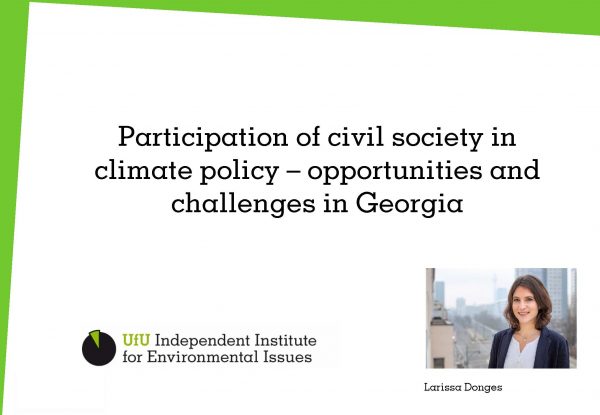
High energy in local workshop in Hue on climate change issues
28. October 2019
Together with the local partners from Mientrung Institute for Scientific Research (MISR), UfU gathered young and energetic people from central Vietnam in Hue, Vietnam, for a successful workshop. The project “Small-scale climate change projects”, supported by the German Federal Foreign Office, allows three young adults to each run a project on climate change awareness raising. The workshop counted 32 participants, amongst which were the three project leaders, and both students and academics from Hue and the surrounding area.
The atmosphere at the workshop was both vivid and focussed. The young adults are worried about the consequences of climate change and explained that they find large parts of the population are not aware of the impacts climate change has and will have. The participants of the workshop shared numerous creative ideas with much potential. They are determined to tackle the issue, full of energy and ready to start.
As the core part of the workshop, the three project leaders gave account of the current status of their projects and explained details and the challenges they face. While all projects received the support of the participants, they were discussed critically with the objective of making them as effective as possible.
At the end of the workshop, the participants received valuable information from communications expert Truong Minh Den from Central for Community Development and Social Work (CODES), on the question of how to enter a dialogue with local people. He emphasized that, for the success of a project, it is vital to involve the local community and to ensure that they accept and support the project.
UfU is excited to follow up on the progress of the projects and will happily share more about this in the upcoming months.
UfU-Cooperation Partner becomes Ukrainian Deputy Minister of Energy and Environmental Protection
2. October 2019
After recent parliamentary elections in Ukraine, the Ministry of Energy and Coal Industry and the Ministry of Ecology and Natural Resources were merged to the Minister of Energy and Environmental Protection. This transformation opens up opportunities for more ambitious climate policy, since the Cabinet of Ministers has appointed Irina Stavchuk to the post of Deputy Minister of Energy and Environmental Protection. We very much congratulate Irina to that important and challenging task. As previous executive director of “Ecoaction” and ex coordinator of the Climate Action Network (CAN) – European Caucasus & Central Asia (EECCA) she brings in a lot of experiences and competences regarding environmental and climate protection as well as the involvement of civil society in these issues. Since 2018 UfU works closely together with “Ecoaction” (and other NGOs) within the project “Strengthen Civil Society for the implementation of national climate policy”, funded by the International Climate Initiative. The aim is to strengthen participation of civil society in climate policy in Ukraine, as well as in Georgia and Colombia. Recent developments give hope, that Ukraine now takes the path towards serious climate policy, including a more ambitious Nationally Determined Contribution (NDC) as well as meaningful civil society involvement in the revision process!
BEACON Catalysing European Local Climate Action Conference
24 July 2019
On May 21, 2019, in Heidelberg, Germany, a conference was held on “Catalyzing Climate Action at European and Local Level”, part of the BEACON (Bridging European & Local Climate Action) project, in which UfU participates as a member of the consortium together with eight other organizations from seven countries. At the heart of the conference was the opportunity for participants from municipalities in all countries to exchange experience with colleagues across Europe on possible practical solutions climate change mitigation.
The conference was organized as a combination of plenary sessions and interactive parallel workshops, divided into three thematic areas:
- Political flow – Climate action for local development with selected themes such as addressing energy poverty, local energy unions and sustainable mobility, discussed with the participation of experts and in small groups.
- Technical Stream – focusing on climate change mitigation solutions, schemes to stimulate energy savings in schools and funding local climate and energy actions.
- Inspiration and Communication – focusing on the effective transmission of climate change information to local stakeholders.
UfU led a workshop on energy saving projects together with our partner NTEF from Bulgaria and the mayor from the Lyulin district. During the seminar dedicated to energy education in schools and financing of local actions for the climate, the mayor of Lyulin district, Milko Mladenov, presented the pilot initiative at 79 Secondary School “Indira Gandi”, which consists of three main aspects – renovation of the school building, implementation of savings verification protocols (created under Horizon 2020 – ICP), alongside the three-year educational initiative to save energy in the school by changing the behavior of pupils and teachers.
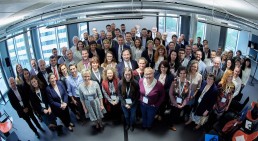
Toolkits - Access to justice in environmental matters
18 July 2019
There are numerous legal possibilities to protect the environment! To ensure that legal professionals, environmental organisations and private individuals can navigate the labyrinth of legal frameworks, the Independent Institute for Environmental Issues, together with Client Earth and Justice & Environment, created a toolkit with helpful information and tips on the legal framework of judicial protection in environmental matters and how to take legal action to protect the environment.
As part of the international project “Access to Justice (A2J – EARL)”, other toolkits have also been launched for Estonia, Poland, Hungary, Slovakia, Austria, France and Spain. The project aims to improve access to justice for a greener Europe and is led by ClientEarth and Justice & Environment with the support of the European Commission LIFE programme.
- Zugang zu Gerichten in Umweltangelegenheiten in Deutschland – Toolkit (in German)
- international toolkits
- information on the project “Access to Justice (A2J – EARL)”
– Workshop / Training on “Current Issues of Access to Justice in Environmental Matters“, June 3, 2019 – Berlin –
In this context, regular events and workshops are offered with the aim to familiarize the public with EU environmental law and to promote professional exchange.
On June 3rd, the Independent Institute for Environmental Matters (UfU) organized a training on access to justice in the House of Democracy and Human rights in Berlin:
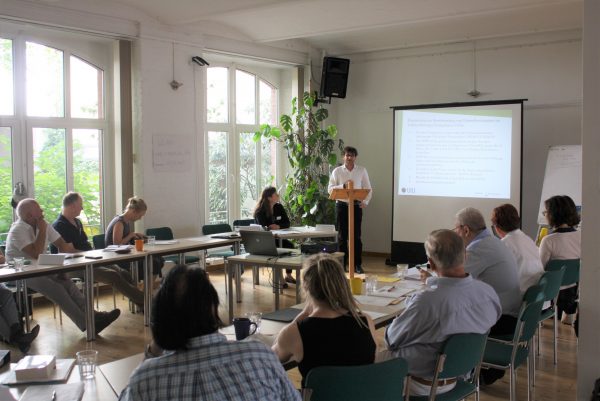
After a brief introduction to the project and the agenda of the current training by UfU employees Alexandra Tryjanowski and Louisa Hantsche (both fully qualified lawyers), highly qualified experts in the field of environmental law began with their specialist lectures.
Ursula Philipp-Gerlach, a renowned German environmental lawyer, gave an overview of the current case law on access to court. The presentation culminated in a brief discussion on the requirements of the Aarhus Convention and EU law on German environmental law. In a second lecture, the Frankfurt lawyer dealt with the financial aspects of environmental proceedings and the question to what extent the cost risk of court proceedings in Germany could be an obstacle to access to justice within the meaning of the Aarhus Convention. This topic was also taken up in the concluding discussion and financial risks were identified as a massive obstacle to the practice of smaller environmental organizations.
The current recognition requirements for environmental associations in Germany were presented by Daniel Lamfried from the Federal Environment Agency. UfU managing director and lawyer, Dr. Michael Zschiesche, added a commentary on the recognition of environmental organizations in the light of disputed compliance cases.
Matthias Sauer, head of the “Freedom of Information, Aarhus Convention, Environmental Liability Law, Better Lawmaking” department at the Federal Ministry for the Environment, talked about current focal points of the implementation of the third pillar of the Aarhus Convention.
Following the specialist presentations, the WWF case (ACCC/C/2016/137 Germany) regarding the recognition of associations, was discussed and the criterion of a functioning internal democracy was debated controversially. At the same time there has been a fruitful exchange between the participants on current challenges and trends of using legal remedies in environmental matters. Also, practical advice such as tips for the critical examination of reports underlying decisions and permits was exchanged.
Please find the workshop’s presentations here (in German).
New Project on water Management in Ukraine
23. April 2019
The project aims to support local authorities in implementing water legislation through capacity building. The exchange with experts from Germany, both from the administration as well as from national environmental NGOs and experts from the Republic of Moldova, aims to strengthen transnational cooperation and to learn from previous experience in the implementation of the WFD.
For this purpose, results and experiences from the project “Capacity building for local water management in the Republic of Moldova” will be transferred to Ukraine and adapted to the specific conditions of the project regions in Ukraine.
For this purpose, representatives from Ukrainian NGOs and Moldavian NGOs and administrations met in Chisinau for the Kick-Off Seminar “Transboundary Cooperation for the Sustainable Management of Small Rivers in the Ukraine – the Dniester Tributary” in order to discuss: challenges and synergies for transboundary cooperation regarding capacity building for the management of small rivers in Ukraine, to exchange information on the status of surface waters and water management policies in the project regions, to look at the results and experiences made in Moldova regarding the process of implementation of the WFD, as well as to attend a meeting of the River Basin Council for the Baltata River which was instituted within the previous project in the Republic of Moldova.
More information on the new project




